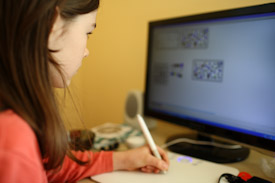
Building Schoolwide Literacy With Free Web 2.0 Tools
A Grade by Grade Elementary Model
Curriculum varies widely from school district to school district and state to state. These project ideas will help teachers envision ways that a focused set of web 2.0 tools can help students build skills in reading, writing, speaking, and listening as they master concepts and skills across the curriculum.
Grade 4
 Tools: Wordle, Bookemon**, Voicethread** (possible individual account$), Mapskip, GlogsterEDU Tools: Wordle, Bookemon**, Voicethread** (possible individual account$), Mapskip, GlogsterEDU
** from PowerPoint templates as needed for differentiation, scafolding
Grade 4 Ideas for Building Literacy with web 2.0 tools:
Wordle: continued use for vocabulary development, key terms, find-the-one-that-doesn’t-belong, visual poetry. Paste in passages from famous authors or advertisements to see which words recur—why? Analyze advertising for junk food, other critical reading. Make a visual “ad” for a book. Possible search terms to use in finding information for a report. Important sites in (state).
Mapskip:
Detailed student-made maps with “stories” in different regions, time zones. Detailed state maps with “stories” at major historic sites. A Kids’ Tour of X(state): places and “stories” every kid should know. A Mouse’s tour of XX: place “stories” told from the point of view of a mouse, flea, colonist, etc. Maps with “stories” based on literature selections, such as locations in novel or place where authors lives/lived. Maps of the locations in an adventure story. Student-created travel tales with a chapter at each location on a map.
Bookemon or Voicethread:
Student-created books for “little buddies” in lower grade (older buddies know the tool and help this year’s kids learn it). Individual Voicethreads of stories, poetry, book reports, with oral reading for expression. Oral commenting back to classmates with appropriate etiquette and clear speech. Listening and responding to comments from others.
GlogsterEDU: Teacher-made Glogs to introduce concepts, with links to web sites, graphics of essential questions, directions. Class or small group “KWL” glogs with links and summaries added. Glog “book reports.” Visual poems.
|

 Tools: Wordle, Bookemon**, Voicethread** (possible individual account$), Mapskip, GlogsterEDU
Tools: Wordle, Bookemon**, Voicethread** (possible individual account$), Mapskip, GlogsterEDU